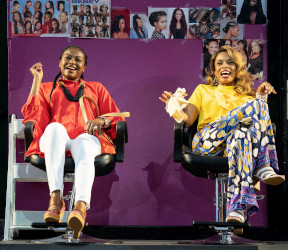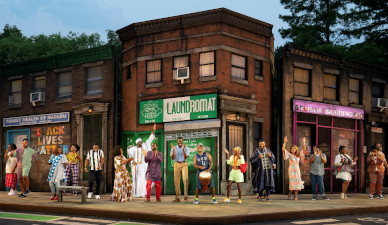THE
"MERRY WIVES" OF HARLEM
Shakespeare in the Park sheds a new light and different light on
the Bard's farcical warhorse.
 |
|
The Merry Wives: Pascale Armand,
left, as Mrs. Page and Susan Kelechi Watson as Mrs. Ford.
Photo by Joan Marcus.
|
MERRY
WIVES
By William Shakespeare
Adapted by Jocelyn Bioh
Directed by Saheem Ali
Presented by The Public Theater
Through September 18 at Delacorte Theater in Central Park.
Tickets are free but must be pre-ordered. go to www.publictheater.org
for schedule and ticket information.
Tradition holds that Queen Elizabeth I, enamored of Sir John Falstaff
from Shakespeare’s Henry IV plays, asked the playwright to
depict that character in love, and that he complied, writing “The
Merry Wives of Windsor” in under a fortnight. Maybe she asked
and maybe she didn’t, and maybe The Bard speed-quilled and
maybe he didn’t, but the play got writ. Somewhat short of
a masterpiece (see “Twelfth Night”), it has nonetheless
remained a comic touchstone for four hundred years and counting.
Most alterations and updates to Shakespeare generally do no harm,
but neither do they shed new light. Jocelyn Bioh’s adaptation
of “Merry Wives,” playing through September 18 at The
Public’s Delacorte Theatre in Central Park, sheds new light
and a different light on the farcical warhorse. Transposing the
only Shakespeare comedy set entirely in England to one set entirely
in NYC’s Harlem is an unexpectedly smooth transition.
The depicted Harlem neighborhood represents the “African diaspora,”
whereby people descendant from that continent’s diverse nations
intermingle to form a vibrant community. Adaptor Bioh and director
Saheem Ali have populated 116th Street with people of Ghanan, Nigerian,
Sierra Leonan and Sengalese descent. Differentiated by accent and
by costume, they nonetheless blend into a homogeneous cohort of
New Yorkers.
Faithful to both Shakespeare and that diaspora, “Merry Wives”
is respectful of the former and illuminating of the latter. Most
of Shakespeare’s comedies are majority prose (as opposed to
verse), composed in the convo of the day. “Merry Wives”
is, in fact, nearly 90 percent prose, the most of any, loosening
the constraints of poesy. Ironically, Bioh’s “translation”
into a combination of New Yorkese, Blackish and slang au courant
is actually more poetic than the source. Most of the accents tend
toward hard vowels and clipped enunciation, which contribute to
exceptional clarity. All, to my ear, are mastered. (How would a
French-inflected Afro-New Yorker pronounce Anne Page? Aahn Paahj,
of course.)
The show features about twelve actors and runs under two hours with
no intermission. This cast is a daunting dozen, demonstrating with
alacrity of pace, pin-point timing and extraordinary teamwork that
100 minutes is the ideal running time. The plot, streamlined but
intact, is just as funny (at least), and the stock characters, adjusted
for time and place (and ethnicity), are just as ludicrous. It’s
a win-win.
Johnny Falstaff, in the rotund person of Jacob Ming-Trent, sends
identical love letters to Nkechi Ford (Susan Kelechi Watson) and
Ekua Page (Pascale Armand), two married women who, it turns out,
are not to be trifled with. Together, they conspire to entrap and
emasculate the hapless would-be seducer. Their husbands, informed
of Falstaff’s intentions but not their wives’ plan,
react separately: Kwame Page (Kyle Scatliffe), trusting his wife,
dismisses the threat; Nduka Ford (Gbenga Akinnagbe), unsure of Nkechi’s
constancy, masquerades as “Brook” to gain Falstaff’s
confidence. The resulting scenes range from dexterous wordplay –
some Will’s, some Jocelyn’s and some blended, and low-comic
absurdity (Falstaff in a laundry basket?).
 |
Cast of "Merry Wives."
Photo by Joan Marcus. |
Director Ali’s quest for actors who could handle Shakespeare’s
text and the Afro dialects while mining the comedy from both was
a resounding success. In the cases of Watson and Armond, Ali might
have added fashion model to the list. The two women, smashing in
designer Dede Ayite’s colorful outfits, appear to be having
as good a time as are their characters. No less striking in appearance
or performance are Scatliffe and Akinnagbe as their husbands.
Falstaff’s wardrobe is as shambling as is the character. Ming-Trent
wears it well. Sad-sack Johnny’s self-deprecation is his redeeming
feature. (A monologue that name-checks the pandemic, Netflix and
Dumbledore is an odd insertion. It is amusing enough, but extraneous
at best. “Didn’t think you’d see me back here,
did you?” should have been a clue.)
When Falstaff is duped into a late-night rendezvous where other-worldly
creatures “pinch him and burn him and turn him about,”
designer Beowulf Boritt’s realistic storefronts are pushed
aside to reveal…Central Park. With treetops swaying in the
night breeze, Jiyoun Chang’s multi-hued lighting effects dance
among the leaves while choreographer Darrell Grand Moultrie’s
joyous wedding celebration plays out. The effect is breathtaking.
In more than a few instances, the combination of Shakespeare’s
text with the adaptation approaches perfection. When Anne Page,
for instance, having married Fenton for love, confronts her parents,
each of whom had wanted her to marry other suitors, mom and dad
accept her choice. (In the Shakespeare, both unsuitable suitors
are tricked into running off with masked males, which, in that time
when men played women’s roles, must have been hilarious. Bioh
finesses that situation with tasteful humor.) When Anne shows up
married, Shakespeare wrote for her father to speak: “Fenton,
heaven give you joy. What cannot be eschw’d must be embraced.”
Her mother says “Heaven give you many merry days.” While
those lovely lines are intact, two of Bioh’s adjustments stand
out. For one, papa Page adds “Welcome to the family.”
For the other, this Fenton, Anne’s spouse-of-choice, is a
woman. Welcome to the twenty-first Century, “Merry Wives.”
|



